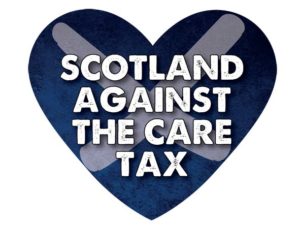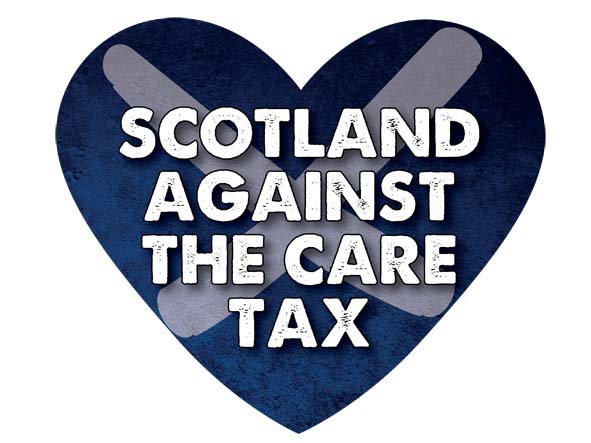Press Release 07/12/2016 – Scotland should end the Care Tax

The campaign group, Scotland Against the Care Tax (SACT), calls on the Scottish Government to end charging people a financial contribution towards their social care. It comes as former leader for the Scottish Labour Party brings a motion before the Scottish Parliament today that will debate the principle and practice of charging people for essential support to live independently and contribute to society of an equal basis. Social care is essential to many disabled people in order to help them take part in the lives of the communities they were born and grew up in. It’s also essential for those who are facing the end of their lives and want to spend their time with dignity and respect in their own communities.
SACT believes that social care charging demands that disabled people pay more than any non-disabled person to achieve the same basic human rights. In some instances it can lead to a disabled individual deciding to forego much needed care and support, a decision that will entail significant risk of harm or further deterioration of an illness or condition. Ian Hood, former Coordinator of the Learning Disability Alliance, states that “for those who are obliged out of necessity to accept local authority care charges, this situation often leads to a stunted life of poverty with insufficient resources to pay for anything more than the bare essentials of life, i.e. heating and food, at the level of spending deemed permissible by the local authority”.
While personal care remains free for over 65’s, disabled people require the same level of support have found themselves paying increasing amounts of their own income towards social care services. In response to ex-Labour MSP Si McMahon’s consultation on abolishing care charges, Inclusion Scotland noted that “over the last 4 years Social Care charges levied by Scottish Local Authorities have risen by an average of 20%… The amount levied can vary between 15% of disposable income and 100%. The meeting of people’s human rights should not be contingent on local priorities.”
The Scottish Government has to date chosen not to exercise its powers to regulate social care charges, leaving decisions on charging at the discretion of local authorities and guidance issued by COSLA. This has led to significant inconsistencies in what levels of social care are provided and what charges are levied in different local authority areas. SACT is cautious that “while the Scottish Government continues to hesitate about what to do, councils sense that if there is ever an end to care charges, then there will be compensation. Those that are more generous may lose out so we now see a race to the bottom with councils desperately increasing the income they collect in the hope of a ‘compensation windfall.’
The Scottish Government should prioritise the human rights of disabled people and make councils completely stop care charging.
– Notes to Editor –
1. Donna Nicholson, Coordinator of Learning Disability Alliance, and Norma Curran, Director of Values Into Action Scotland, will be available for interview on Tuesday 6 December at: [LDA – office@ldascotland.org / 07920 141 823]
2. Scotland Against the Care Tax is a campaign group with 30+ members, including large and small national organisations, people with lived experience, and carers pursuing the end to social care charges in Scotland.
3. The Learning Disability Alliance (LDAS) exists to people with learning disabilities from all over Scotland to have a political voice on national matters that affect them and to and express their own views and experiences to politicians at every level of Scottish political life. Given the challenges the learning disabled face today because of cuts, welfare reforms and increased care charges, to name but a few, there has never been a greater need for our work. At present we have an alliance of 44 member organisations supporting our work from across the charitable sector in Scotland.
4. Inclusion Scotland (IS) is a consortium of organisations of disabled people and disabled individuals. Through a process of structured development we aim to draw attention to the physical, social, economic, cultural and attitudinal barriers that affect our everyday lives as disabled people in Scotland. We aim to encourage a wide understanding of those issues throughout mainstream thought in Scotland. In short, we want to reverse the current social exclusion experienced by disabled people through civil dialogue, partnerships, capacity building, education, persuasion, training and advocacy.

